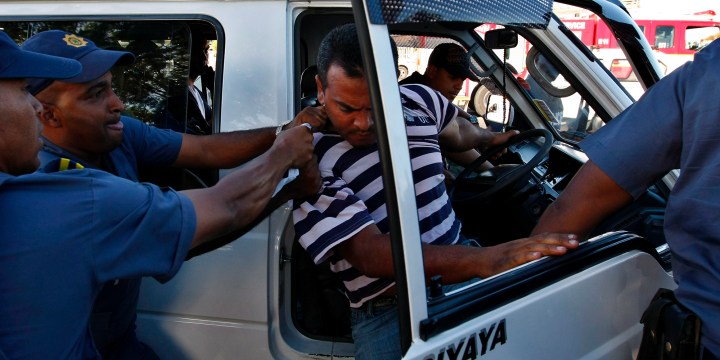TAXI INDUSTRY
Conflict resolution mechanism in disarray, inquiry into taxi violence told

Having earlier heard evidence of a poor licencing system, on 12 February 2020 the Shongwe Commission of Inquiry into Taxi Violence in Gauteng heard that the industry’s conflict resolution mechanism is also in disarray.
Gauteng deputy director for conflict resolution, registration and monitoring Peter Dhlamini, told the Shongwe Commission of Inquiry into Taxi Violence that the task of dealing with conflict within the province’s taxi industry lay with him. Asked by commissioners if he was trained for this, Dhlamini said he had never received training:
“Very unfortunately, I was not trained. There was no formal training altogether. The only formal training I had in the department was drafting legislation. When we complained about lack of capacity we were told relevant courses would be identified to upskill us but that has not transpired. I have no training, I have to rely on my personal skills.”
Dhlamini told the commission that a number of cases remained unresolved because of lack of capacity in his department.
Evidence leader advocate Richard Mkhabela asked Dhlamini if his verdicts were respected. “Do people adhere to what you conclude? Is your office respected?” asked Mkhabela. Dhlamini said not all his verdicts were implemented.
“Some have not been implemented in a very long time, and those that are respected are those in which there is an involvement of law enforcement,” replied Dhlamini.
Commissioner Lungile Mabece asked what would happen if a taxi operator wanted to operate on two routes, and was granted permission. Dhlamini said he did not know what would happen in such a case.
Dhlamini said if the parties to a dispute were not satisfied with a verdict, it was open to them to approach the Transport Appeals Tribunal. However, he said some taxi associations simply took matters straight to court.
When commissioner Mabece asked if there was something that the national or provincial government was doing which contributed to conflict, Dhlamini said the government acted in secrecy.
“Government operates as if we were in a different country. When a metro is developing a mall the department won’t know. We will only know when there is conflict. That’s when we are told. Government must stop operating in silos. That will help us avert much conflict,” said Dhlamini.
Violence and intimidation in the taxi industry also took centre stage during Dhlamini’s submission. He told the commission that lawlessness was rife in the taxi industry. He said the violence and intimidation were perpetrated by taxi operators in patrol cars belonging to the different associations.
Each patrol car bears the name of the association to which it belongs, and whoever they abuse is able to report them. But none of the patrollers — also known as patrol squads — have been brought to book despite Dhlamini alluding to a number of incidents of intimidation by the squads. The patrol squads were meant to prevent encroachment on various routes.
An operator who is found to have encroached is fined up to R3,000 by the operators to whom that route was allocated. Dhlamini admitted he did not know who enforces this. “We have no law enforcement.”
Dhlamini said even scholar transport was subject to intimidation by taxi associations.
“Other scholar transport operators pay rent to these associations to use some routes. But there is nothing we can do about that.”
Dhlamini told the commission that in one instance a bus company was forced to pay money to the patrol squads. He said he had to intervene in another case where a Tshwane food company which had applied for an operating licence had their bus impounded by the squads.
“They claimed even the defence force asks for permission to operate in their territory,” said Dhlamini.
Dhlamini told the commission that law enforcement was not helpful and that some associations did not want police to be present when they resolved their disputes because of trust issues.
“SAPS returns cases to us. They tell us it’s a transport issue. They don’t care if there are criminal aspects that require their attention in the matter. They will tell us to sit down and talk, but how can we sit and talk with criminals?”
Dhlamini said a woman was killed soon after she had reported lawlessness within the association of which she was a member.
Dhlamini told the commission that the lack of capacity in his department was also a major issue which made it difficult for the skeleton staff in many regions to perform their duties. He joked that he would end up being called “capacity” because he so frequently referred to the subject.
He said lack of capacity was a huge challenge in places such as Tshwane and Ekurhuleni. Dlamini said Tshwane had one assistant director and no officials to assist. “We rely on the assistance of four interns, but they cannot drive,” he said.
“Ekurhuleni is the same, with one administration officer and two clerks. Sometimes one of the clerks has to drive and leave only one to do all the work.”
The commission heard that unqualified staff were forced to deal with conflict resolutions because the department did not have qualified personnel. On Tuesday 11 February 2020 the commission was told of the department’s poor licencing system.
Dhlamini told the commission that current legislation had no effect. “Legislation does not have the impact it’s meant to have in holding taxi associations to account.”We also find it very difficult to enforce the law because we are not empowered,” he said.
Dlamini added: “We don’t have a piece of legislation to rely on in the event of an encroachment which makes our conflict resolution efforts much more difficult.” DM
The commission continues on 13 February 2020.
















 Become an Insider
Become an Insider